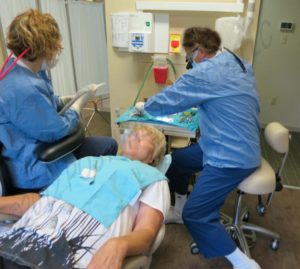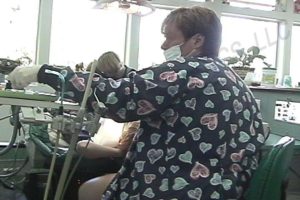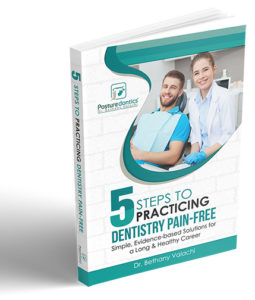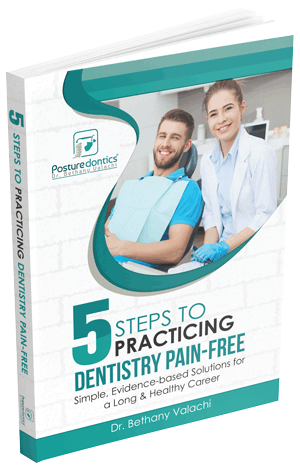-Dr. Bethany Valachi-
Manufacturers frequently tout the esthetic and productivity features of different delivery systems, however the way the system is used and adjusted can either benefit or worsen your health. Here, I highlight the most common ergonomic challenges with delivery system and easy resolutions!
Rear-Delivery Systems

Rear-delivery systems work best when true four-handed dentistry is practiced (i.e., equipment is within reach of the assistant, who transfers all instruments to the dentist, retrieves hand pieces and changes burs).
What I find clinically, however, is that most dentists with rear delivery do not fully utilize the assistant, and repeatedly twist to one side to retrieve instruments and handpieces. Repeatedly twisting in one direction has been shown in studies to contribute to low back pain. Doctors with rear delivery systems must learn to fully utilize the assistant, or choose a different style of delivery in order to prevent back injury.
Rear delivery is the poorest method of delivery in two-hand function (i.e. the hygiene operatory). To avoid damaging twisting motions, hygienists who work with a rear delivery system should try to retrieve instruments with the closest (non-dominant) hand to avoid repeated twisting or reaching across the body and then transfer the instrument to the dominant hand.
Side-Delivery Systems
Side-delivery systems are optimal for hygiene operatories as they encourage less trunk-twisting than rear delivery systems and can easily be moved with the hygienist around the patient’s head.

The most common ergonomic mistake I see with side delivery systems is when they are positioned too high. The instruments and hand pieces on the delivery system should not be above elbow height. Reaching to the side and above elbow level is one of the worst biomechanical movements for your shoulder. In the 4-handed operatory, productivity may be slightly compromised with side delivery, since the assistant cannot reach the instruments and be fully utilized.
Over-the-Patient Systems
Over-the-patient delivery systems are located over the chest of the patient, so allow you to move freely from the 8 o’clock to 12 o’clock positions around the patient’s head. This design may be less ideal for operators with short torsos, who may be forced to repeatedly reach upward for instruments, risking neck and shoulder pain. This may be resolved with a saddle stool, which naturally positions the operator higher (halfway between standing & sitting) and allows lower placement of the delivery system.
Learn Dr. Valachi’s 10-Step Patient Positioning Sequence
CLICK HERE
©2017 Posturedontics, LLC . All rights reserved

 How can you protect your back, neck, shoulders, and hands for a long and healthy career?
How can you protect your back, neck, shoulders, and hands for a long and healthy career?

